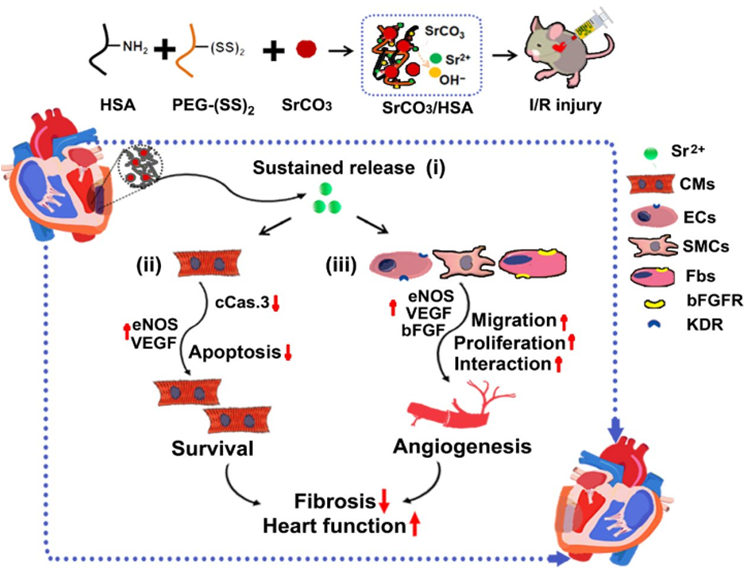Researchers Reveal Therapeutic Effects of Sr2+ for
Myocardial Ischemia/Reperfusion Injury
A recent study published online in Science Advances, revealed the role of strontium ions (Sr2+) in the promotion of myocardial repair in ischemia/reperfusion (I/R) hearts. This research was collaboratively performed by Dr. YANG Huang-Tian's research team from the Shanghai Institute of Nutrition and Health of the Chinese Academy of Sciences (CAS) and Dr. CHANG Jiang's research team from the Shanghai Institute of Ceramics of CAS.
Cardiovascular disease is a leading cause of mortality worldwide. The mortality of acute myocardial infarction (MI) is rising rapidly in China, bringing serious health and economic burden to residents and society. Timely restoration of blood supply after MI is crucial and necessary for the treatment of MI, while it can cause new injury, known as myocardial I/R injury. The MI-caused loss of enormous cardiomyocytes and the formation of fibrous scar would induce heart failure and arrhythmias, resulting in high mortality. Therefore, it is of great clinical significance to explore new therapeutic strategies targeting at the promotion of cardiomyocyte survival and restoration of destroyed blood vessel network in the early stage of MI.
Previous studies revealed that silicon ions-containing materials promoted the recovery of the myocardial function after MI, suggesting a new therapeutic strategy by use of abundant trace elements for ischemic heart disease. In the current report, the researchers further explored the possibility of Sr2+ in the treatment of I/R hearts.
Strontium is an essential trace element for human body, which mainly exists in human teeth and bones. It can be ingested through food and water, and mainly metabolized through urine. Because Sr2+ has a variety of regulatory effects on bone formation, Sr-containing drugs, such as strontium ranelate, strontium chloride, are widely used in the treatment of osteoporosis, osteogenesis, ricochet disease, etc. Sr2+ has been found to promote angiogenesis in the promotion of bone regeneration, but its role in the heart has not yet been reported and it is unknown whether its effect in promoting angiogenesis can be beneficial to I/R heats.
Researchers found that Sr2+ promotes the proliferation and migration of endothelial cells, smooth muscle cells, and fibroblasts; enhances the expression of angiogenic factors and cell interaction; reduces cardiomyocyte apoptosis in vitro.
Further, the researchers prepared a Sr2+composite hydrogel with the characteristics of injectability, degradability and the ability to sustainably release Sr2+ in appropriate concentrations. They proved that intramyocardial injection of Sr2+ hydrogel at 20 minutes after reperfusion following 60 minutes of ischemia significantly improved the cardiac function and reduced scar formation at one month post-I/R of mice. These improvements were accompanied with improved angiogenesis and decreased cardiomyocyte apoptosis. In addition, Sr2+ hydrogels were degraded two weeks after injection and Sr2+ were mainly excreted through urine without accumulation in other organs.
These findings reveal the novel role of Sr2+ in the promotion of ischemic myocardial repair. Considering advantages of Sr2+ in low cost, stability and biosecurity, Sr2+ may be developed to be a new therapy for ischemic heart disease.
This work entitled “Strontium ions protect the hearts against myocardial ischemia/reperfusion injury” was published online on January 15, 2021. The research was supported by the National Key R&D Program of China, Strategic Priority Research Program of CAS, National Natural Science Foundation of China, and Shanghai Municipal Natural Science Foundation.

The schematic diagram of the Sr2+ hydrogels in myocardium repair after I/R.
(Image by Dr. YANG’s research team)
Media Contact:
WANG Jin (Ms.)
Shanghai Institute of Nutrition and Health,
Chinese Academy of Sciences
Email: sibssc@sibs.ac.cn
Web: http://english.sinh.cas.cn/
